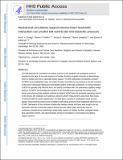Mechanical circulatory support device-heart hysteretic interaction can predict left ventricular end diastolic pressure
Author(s)
Chang, Brian Yale; Keller, Steven; Josephy, Noam; Edelman, Elazer R
DownloadAccepted version (1.099Mb)
Terms of use
Metadata
Show full item recordAbstract
The full potential of mechanical circulatory systems in the treatment of cardiogenic shock is impeded by the lack of accurate measures of cardiac function to guide clinicians in determining when to initiate and how to optimally titrate support. The left ventricular end diastolic pressure (LVEDP) is an established metric of cardiac function that refers to the pressure in the left ventricle at the end of ventricular filling and immediately before ventricular contraction. In clinical practice, LVEDP is typically only inferred from, and poorly correlates with, the pulmonary capillary wedge pressure (PCWP). We leveraged the position of an indwelling percutaneous ventricular assist device and advanced data analysis methods to obtain LVEDP from the hysteretic operating metrics of the device. We validated our hysteresis-derived LVEDP measurement using mock flow loops, an animal model of cardiac dysfunction, and data from a patient in cardiogenic shock to show greater measurement precision and correlation with actual pressures than traditional inferences via PCWP. Delineation of the nonlinear relationship between device and heart adds insight into the interaction between ventricular support devices and the native heart, paving the way for continuous assessment of underlying cardiac state, metrics of cardiac function, potential closed-loop automated control, and rational design of future innovations in mechanical circulatory support systems.
Date issued
2018-02Department
Massachusetts Institute of Technology. Institute for Medical Engineering & ScienceJournal
Science translational medicine
Publisher
American Association for the Advancement of Science (AAAS)
Citation
Chang, Brian Y. et al. “Mechanical circulatory support device-heart hysteretic interaction can predict left ventricular end diastolic pressure.” Science translational medicine, vol. 10, no. 430, 2018 © 2018 The Author(s)
Version: Author's final manuscript
ISSN
1946-6242